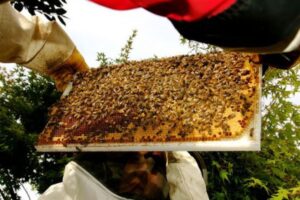Criminal Rehabilitation Abuzz with Beekeeping

A group of New York City prisoners may become beekeepers. That’s because the Osborne Association, a nonprofit focused on providing certain tools for alternatives to longer prison sentences, took several prisoners on a beekeeping tour, reports DNAinfo.com.
The program, called Justice Community, helps to provide incarcerated individuals with opportunities to explore job training options and service programs. And urban beekeeping may be a worthy career choice for the prisoners once they’re eligible for work. The practice is experiencing a serious renaissance—even the famed Waldorf Astoria hotel has installed hives on its roof.
While the program doesn’t guarantee the prisoners jobs, it does provide them some factoids and glimpses at opportunities they may not have considered for when they finally are free.
And there’s perhaps more in common between prisoners and bees than one might think. Many prisoners and bees are victims of reversible systems that have created colossal epidemics: According to the Bureau of Justice Statistics approximately 25 percent of prisoners in the U.S. are there because of drug charges (more than 50 percent of federal prisoners in 2008 were arrested on drug charges). One in eight are there for marijuana-related activity—a plant that’s already legal in 17 states for medicinal uses and could become legal for recreational use as well in Washington and Colorado after next month’s vote. Similarly, Colony Collapse Disorder, which has affected millions of bees and destroyed thousands of hives around the country, has been connected to a cocktail of chemical pesticides used on agriculture crops—mainly those that are genetically modified. Bees are pollinators and are crucial in food production. They pollinate an estimated one-third of all our food. Continued decline in bee populations could lead to food shortages—an important consideration as droughts continue to plague American farmland.
Keep in touch with Jill on Twitter @jillettinger
Image: Don Hankins

